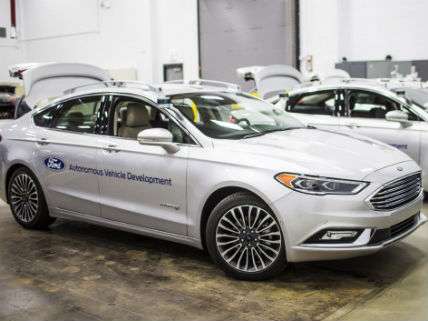Ford Gets It Right on Self-Driving Cars
Go for full self-driving capability, not half-assed autonomy.

Ford Motors has just unveiled the latest iteration of its self-driving automobile, a modified Ford Fusion that processes a terabyte of information per hour from lidar, radar, optical sensors, high resolution 3D maps, GPS and more to navigate itself. The new vehicles still require someone to sit in the driver's seat to monitor the car and take over if it gets confused. However, Ford is on the right path; the company wants to build a fully autonomous car available for ride-hailing and ride-sharing services by 2021. That car will dispense with fripperies like steering wheels and pedals.
The key is that Ford is aiming for full autonomy, not half-assed autonomy that requires a driver to take over whenever an alarm bell sounds. Chris Brewer, Chief Program Engineer, Ford Autonomous Vehicle Development explains:
Building a car that will not be controlled by a human driver is completely different from designing a conventional vehicle, and this raises a whole new set of questions for our autonomous vehicle engineering team: How do you replicate everything a human driver does behind the wheel in a vehicle that drives itself? …
Just as we have confidence in ourselves and other drivers, we need to develop a robust virtual driver system with the same level of dependability to make decisions, and then carry them out appropriately on the go. We're doing that at Ford by taking a unique approach to help make our autonomous cars see, sense, think and perform like a human?—?in fact, better, in some cases.
With regard to performing better than human drivers, automated vehicles will have access to lots more information. For example, the Ford Fusion cars' lidars have a 360 degree sensing range the length of two football fields. Virtual drivers could use this superior information and their finer control over the car's steering, brakes, throttle, etc. to pull off evasive manuevers in dangerous situations that a normal human could not achieve.
For more skeptical view of when fully autonomous vehicles will become available, see Reason Foundation Director of Transporation Policy Bob Poole's Reason TV interview below. Among other things, Poole says that his skepticism about the speedy deployment of self-driving cars "is coming from researchers, serious researchers, not reporters writing in the popular press, at UC Berkeley, at Carnegie-Mellon, and at MIT…." Ouch.
For a reporter's view, see my article, "Will Politicians Block Our Driverless Future?" Bob, want to place a friendly bet?


Show Comments (343)